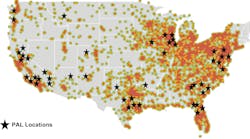The crucial question is how quickly will consumer confidence—the bulwark of the U.S economy-- snap back after being depressed by the uncertainty and fears engendered by a nation gone to war on terrorism, abroad and at home.
Echoing the fact no one has ever been down this road before, economist Jerry Leonard of Ormond Beach, FL-based Martin Labbe Associates (MLA) says any economic forecast issued right now should be regarded a “work in progress.”
Be that as it may, Leonard is willing to predict that the decline in freight traffic will level off in the first quarter of ’02 and then start to improve in the second quarter. “Expect to see good, solid growth in the second quarter,” says Leonard, “and for it to increase faster toward the second half.”
If consumer confidence bounces back this fall, according to analyst Chris Brady, president of Manhasset, NY-based Commercial Motor Vehicle Consulting, trucking will see shipment volumes rise gradually through next year.
As autumn unfolds, economic prognosticators will be closely tracking key indicators of that all-important bellwether, consumer spending activity.
Right after the attacks, consumer confidence plunged to its lowest level since early 1996. In late September , for example, the New York-based Conference Board reported that it s consumer-confidence index sank to 97.6 from 1 revised 114.0 mark in August—amounting to the largest monthly point drop seen since the Persian Gulf War of 1991.
Brady, of Commercial Motor Vehicle Consulting, points out that retail sales results for September were 2.5% below that of August. “That’s a small percentage but it represents a steep drop,” he states. “Before September 11, the inventory correction needed for shipments to pick up again looked nearly completed. But with the falloff in retail sales, inventories have become excessive again.
“As a result,” he continues, “freight levels that were already depressed will now decline further. “We will have to wait for the October and November retail-sales data to see if that pull-back in consumer spending was temporary or not.
“If it was a momentary decline, the necessary inventory correction will be completed by the end of this year and then we’ll see a gradual increase in shipment volumes through ’02,” Brady figures. “But if consumers don’t come back this fall, the inventory correction will continue through the first half of ’02 and there will be a further decline in shipment volumes. The question remains whether the aftershock to consumer confidence was temporary or something that will last longer.”
Both Brady and MLA’s Leonard agree that the economic news fro trucking this year would be worse had housings tarts not held up as well as they have thus far.
“The difference from other downturns,” Brady reasons, “is that the Fed reacted quickly and aggressively lowered interest rates, which has helped keep the construction segment in better shape.”
“Housing has been one of the things that has helped trucking in spite of the drop in the manufacturing sector,” says Leonard. “However, the most recent report by the National Association of Homebuilders shows that housing starts have begun to fall off. Although that data suggest the terrorist attacks ushered in this downturn, we expected it anyway because housing stocks have become relatively high.”
Along with housing starts, Leonard notes that uncertain times tend to hamper purchases of durable goods. However, he says nondurable goods are not as cyclical and won’t be affected to the same degree.
Another bright note Leonard offers is that housing starts will not fall off as much they did in the recession of 1991—due to the low mortgage rates prevailing now. “Back then, in ’91,” he notes, “everything was going bad. That’s not the case today.”
Leonard stresses that he expects both business investment and the all-important consumer spending to rise going into the new year. ““As consumers comes back,” he states, ‘we will see a quick response by manufacturers.”
As for other near-term effects of the September 11th aftermath, Commercial Motor Vehicle Consulting’s Brady says to look for insurance rates to rise but fuel prices to stay down.
“Insurance companies will be taking a huge hit to cover their losses related to September 11th,” he reasons, “which will lead to higher insurance rates across the board. In addition, truck fleets may be viewed as being of higher risk than before and wind up getting a bigger whack from insurance carriers.”
As for fuel, Brady says that barring political fallout from the overseas war being waged on terrorism—such as bombing beyond Afghanistan—that could compel OPEC to cut back production, diesel fuel prices should remain low, at least for the time being.


